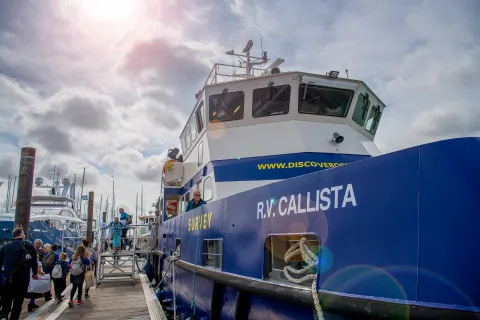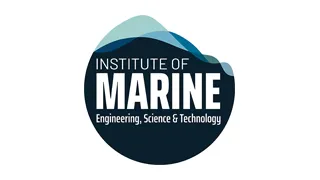Facilities

National Oceanographic Library

Study our Oceanography MSc at the University's School of Ocean and Earth Science, based at the National Oceanography Centre Southampton (NOCS). NOCS is home to the largest single group of marine and earth scientists in the world.
On this master's you'll work alongside experts in their field as you learn how to become an oceanographer. You'll learn how they develop their understanding of marine systems, from coasts to the vast unexplored deep ocean.
You’ll be taught by researchers at the forefront of their disciplines, contributing to some of today’s biggest challenges, such as:
This course is open to UK and international students who are passionate about working in marine science but may not have previous experience. This course welcomes students from all scientific backgrounds. Oceanography is a numerate discipline and this is reflected in some of the modules you will take.
You’ll benefit from the centre’s modern equipment, laboratory facilities and dedicated teaching vessel, Callista. Our flexible course structure means you can mix and match your module choices to adapt your studies around career goals
This course also allows you to specialise your studies in a specific area.
Study theme options include:
We regularly review our courses to ensure and improve quality. This course may be revised as a result of this. Any revision will be balanced against the requirement that the student should receive the educational service expected. Find out why, when, and how we might make changes.
Our courses are regulated in England by the Office for Students (OfS).
“I chose Southampton because it is world-renowned for ocean sciences, and one of the best places to study with access to leading scientists in the field. ”


This course is based at Waterfront (National Oceanography Centre Southampton).
This qualification is awarded by the University of Southampton.
The Course Description Document details your course overview, your course structure and how your course is taught and assessed.
You’ll need a 2:1 degree in one of the following subjects:
Find the equivalent international qualifications for your country.
Oceanography is a numerate discipline and this is reflected in some of the modules you will take.
If English isn't your first language, you'll need to complete an International English Language Testing System (IELTS) to demonstrate your competence in English. You'll need all of the following scores as a minimum:
We accept other English language tests. Find out which English language tests we accept.
If you don’t meet the English language requirements, you can achieve the level you need by completing a pre-sessional English programme before you start your course.
If you don’t meet the academic requirements, you can complete a pre-master's programme through our partnership with OnCampus. Learn more about the programmes available.
If you don’t have the exact entry requirements, we'll consider your application based on your:
Please contact us if you're not sure you have the right experience or qualifications to get onto this course.
Email: enquiries@southampton.ac.uk
Tel: +44(0)23 8059 5000
We offer a range of compulsory and optional modules. This allows you to design your degree to follow a general oceanography theme, or to specialise in one of these areas:
You'll be able to confirm your module selection after you apply.
This course runs for a full 12-month year, not an academic year.
Semester 1 runs from September to January. You will complete compulsory introductory modules and a key-skills module designed to help develop your foundation knowledge before the second semester.
Introductory modules include:
You’ll complete hands-on field work experience using our in-shore research vessels, while developing practical skills in sampling and interpreting data from a variety of coastal marine environments.
You’ll select 1 of these modules to develop your ability to handle scientific datasets:
You’ll also select 1 optional module based on your interests from:
Semester 2 runs from February to June.
You’ll choose 3 additional modules based on your interests from the following:
After these modules, you’ll complete a 3 month independent research project over the summer, working alongside academics. These projects are aligned with large international research programmes so you will get experience in scientific research and access to a global network of researchers who are tackling ocean-related issues.
Project results are often published as scientific papers. You’ll also develop your skills in project management, data analysis, scientific communication and oceanography.
Module availability is subject to timetable constraints and staff availability.
Want more detail? See all the modules in the course.
The modules outlined provide examples of what you can expect to learn on this degree course based on recent academic teaching. As a research-led University, we undertake a continuous review of our course to ensure quality enhancement and to manage our resources. The precise modules available to you in future years may vary depending on staff availability and research interests, new topics of study, timetabling and student demand. Find out why, when and how we might make changes.
You must study the following modules :
Introduction to general aspects of biological oceanography from phytoplankton to fish. The module is designed for students with no previous experience of studying biological systems. The module follows the flow of energy from light, via primary producer...
The module is designed for graduates in any science discipline embarking on postgraduate studies in Ocean and Earth Science.
This course will cover the formation of ocean basins; the role of mid-ocean ridges in basin scale processes; structure and geological processes at continental margins; sedimentary processes within and on the boundaries of ocean basins; and the past histor...
The module provides an introduction to the physics of the ocean including aspects of both descriptive and dynamical physical oceanography. The focus is on the understanding of physical processes which control the movement of water, heat, salt and other pr...
This module provides essential key skills training to MSc students within Ocean and Earth Science.
The MSc project will entail four months of full-time work investigating a topic related to Marine/Earth/Environmental science, and culminating in the submission of a dissertation. The project is conducted on a novel question, often associated with a large...
You must also choose from the following modules :
The module covers, at advanced level, three topics that are central to applied geophysics in the marine environment.
This module looks at the operation of the Ocean as a biogeochemical entity within the larger Earth System. There is a strong focus on how the Earth System will respond to anthropogenic impacts and global change.
Biological data science is a rapidly evolving field at the intersection of biology, statistics, and computer science. There is a growing demand for professionals skilled in analysing and interpreting data as well as an expectation that students will be fa...
This module is designed to give a fundamental understanding of the Earth's climate and use this to examine topical issues in climate change research. A hands-on approach enables you to apply your newly learned skills to real-world problems quickly.
The module will present a variety of different types of oceanographic, meteorological, geophysical, and remote sensing data and will explore methods for processing, analysing and modelling using Python. This module introduces you to the essential skill...
This module examines the patterns of life in deep-sea environments & the processes that govern those patterns.
This course is intended as a beginner’s guide to marine ecological modelling. It is suitable for students across a broad range of academic backgrounds and does not assume a high level of prior mathematical knowledge or experience in coding. The course...
This module uses contemporary observational datasets and model output to explore large-scale ocean dynamics, variability and its influence on the climate
This module is only open to Year 3 students registered on MSci Biology and Marine Biology, BSc Biology and Marine Biology, BSc Marine Biology with Oceanography, MSci Marine Biology and Oceanography, MSci Marine Biology and BSc Marine Biology degrees. MSc ...
This module looks at the roles of marine microbes in the ecosystems as well as in biogeochemical cycling - how they interact with each other, with multicellular organisms and the environments - especially through the use of modern molecular biological too...
This module will cover all aspects of reproduction in marine organisms.
Understanding changes in sea level is of the utmost importance, as it: (1) shapes the coastlines; (2) affects the livelihoods of hundreds of millions of people living in the world’s coastal regions, and (3) is a key indicator of climate change. Sea-level ...
In this module students work through many of the data analysis and interpretation steps to evaluate plans for an offshore windfarm, using an example site in the east Solent. With the University of Southampton’s unique access to its own research vessel t...
You’ll participate in lectures, seminars and you’ll complete independent study and practical assignments throughout the course. You’ll be expected to work independently (with a dedicated supervisor) on your final research project.
Activities will depend on the modules that you take.
We offer a variety of different learning activities to help you learn, including:
We'll assess you through a combination of the following methods:
Explore course modules for full details of learning and assessment.
You'll need to use the methods, techniques and skills you learn in the taught part of the programme to write a dissertation.
You'll be supported by your university personal tutor and researcher at OES during the research part of the course.
This degree will allow you to develop and evidence subject-specific and targeted employability skills. This includes the required skill set for a range of future careers, further study, or starting your own business.
The skills you can expect to focus on and gain from this course include:
The employability and enterprise skills you'll gain from this course are reflected in the Southampton skills model. When you join us you'll be able to use our skills model to track, plan, and benefit your career development and progress.
Download skills overview
Graduates commonly work in a range of organisations or sectors including:
universities,
Government research laboratories,
Armed services,
Charities,
Marine conservation and environmental consultancies,
Pollution and water control companies,
Fisheries and aquaculture organisations.
*Example graduate job titles and job prospect statistics taken from The Graduate Outcomes Survey, which gathers information about the activities and perspectives of graduates 15 months after finishing their course.

Choosing to do work experience is a great way to enhance your employability, build valuable networks, and evidence your potential. Learn about the different work and industry experience options at Southampton.
We are a top 20 UK university for employability (QS Graduate Employability Rankings 2022). Our Careers, Employability and Student Enterprise team will support you. This support includes:
We have a vibrant entrepreneurship culture and our dedicated start-up supporter, Futureworlds, is open to every student.
Your career ideas and graduate job opportunities may change while you're at university. So it is important to take time to regularly reflect on your goals, speak to people in industry and seek advice and up-to-date information from Careers, Employability and Student Enterprise professionals at the University.
Fees for a year's study:
If you're an international student on a full-time course, we'll ask you to pay £2,000 of your tuition fees in advance, as a deposit.
Your offer letter will tell you when this should be paid and provide full terms and conditions.
Find out about exemptions, refunds and how to pay your deposit on our tuition fees for overseas students page.
Your tuition fee covers the full cost of tuition and any exams. The fee you pay will remain the same each year from when you start studying this course. This includes if you suspend and return.
Find out how to pay your tuition fees.
Accommodation and living costs, such as travel and food, are not included in your tuition fees. There may also be extra costs for retake and professional exams.
Explore:
If you’re a graduate of the University of Southampton, you could be eligible for a 10% discount on your postgraduate tuition fees.
This can help with course fees and living costs while you study a postgraduate master's course. Find out if you're eligible.
A scholarship of £3,000 is available to international students studying for a postgraduate master’s in Ocean and Earth Science.
Find out more about Southampton Ocean and Earth Science Postgraduate International Scholarship, including eligibility and conditions.
The Society for Underwater Technology’s Educational Support Fund offers sponsorship awards to high calibre undergraduate and postgraduate students embracing at least one relevant component area of marine science, underwater technology or offshore engineering. Find out more about the funding by visiting our website.
A variety of additional funding options may be available to help you pay for your master’s study. Both from the University and other organisations.
Find out about funding you could get as an international student.
For further details of our admission process, read our step by step guide to postgraduate taught applications.
The deadline to apply for this course is Tuesday 9 September 2025, midday UK time.
We advise applying early as applications may close before the expected deadline if places are filled.
The deadline to apply for this course is Tuesday 26 August 2025, midday UK time.
We advise applying early as applications may close before the expected deadline if places are filled.
We’ll ask you to pay a £50 application assessment fee if you’re applying for a postgraduate taught course.
This is an extra one-off charge which is separate to your tuition fees and is payable per application. It covers the work and time it takes us to assess your application. You’ll be prompted to pay when you submit your application which won’t progress until you've paid.
If you're a current or former University of Southampton student, or if you’re applying for certain scholarships, you will not need to pay the fee. PGCE applications through GOV.UK and Master of Research (MRes) degree applications are also exempt. Find out if you’re exempt on our terms and conditions page.
When you apply you’ll need to submit a personal statement explaining why you want to take the course.
You’ll need to include information about:
You'll also need to submit two references, one academic reference and one academic or professional reference.
Please include the required paperwork showing your first degree and your IELTS English language test score (if you are a non-native English speaker) with your application. Without these, your application may be delayed.
You'll be able to track your application through our online Applicant Record System.
We will aim to send you a decision 6 weeks after you have submitted your application.
If we offer you a place, you will need to accept the offer within 30 working days. If you do not meet this deadline, we will offer your place to another applicant.
Unfortunately, due to number of applications we receive, we may not be able to give you specific feedback on your application if you are unsuccessful.
We treat and select everyone in line with our Equality and Diversity Statement.
Please contact us if you're not sure you have the right experience or qualifications to get onto this course.
Email: enquiries@southampton.ac.uk
Tel: +44(0)23 8059 5000
